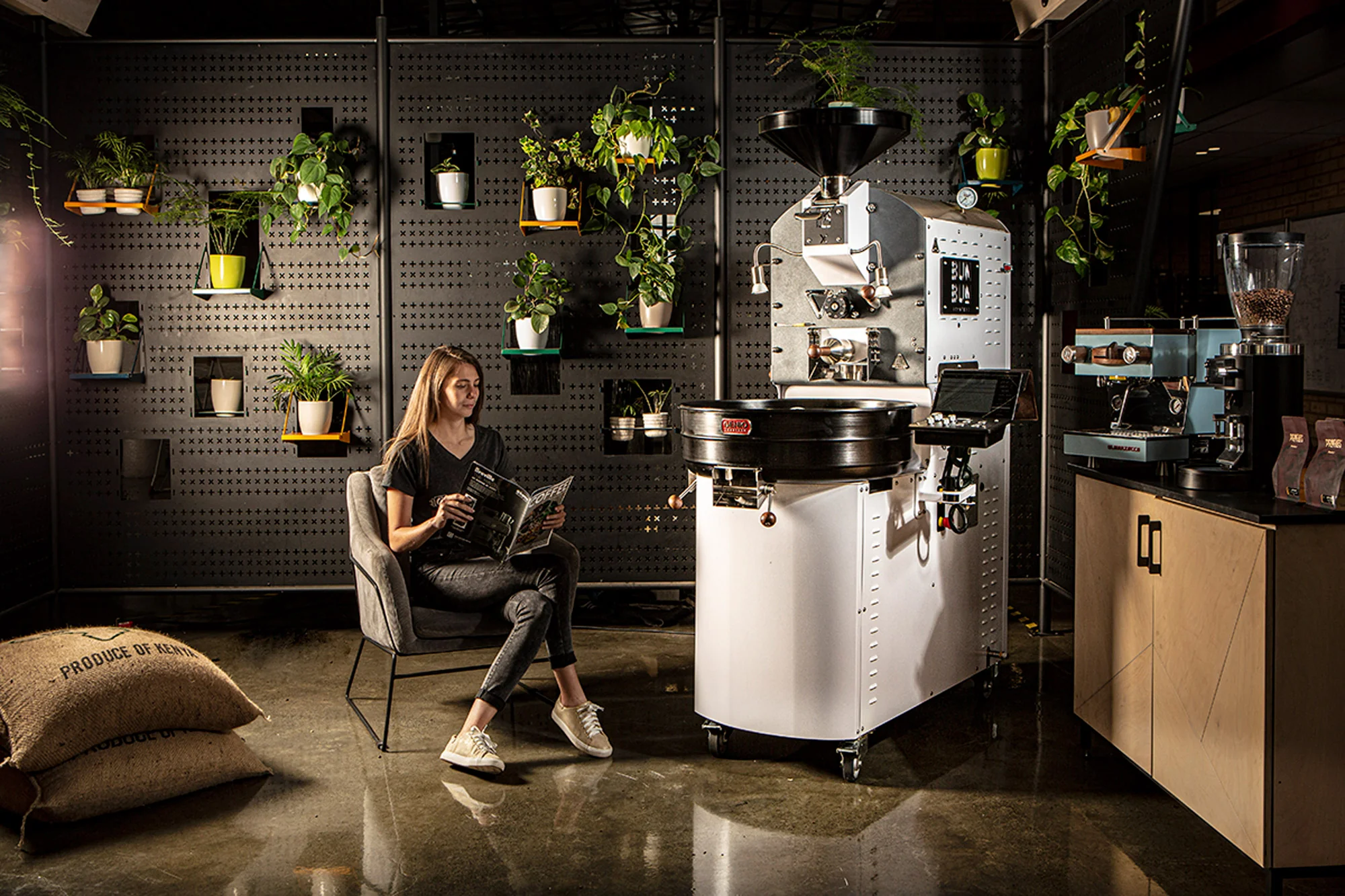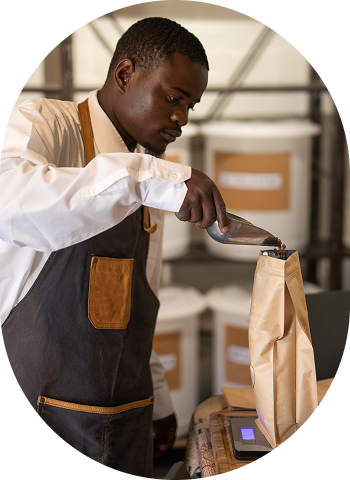Coffee Shop Roasters Built for Precision

Introduction
The third wave of coffee has redefined the landscape of modern cafes. Coffee lovers today expect more than just a decent cup of coffee—they seek character, traceability, and freshness in every brew. This elevated expectation has prompted a growing number of specialty cafes to bring roasting in-house. At the heart of this transformation are high-performance, compact machines known as coffee shop roasters.
A coffee shop roaster enables a cafe to source, roast, and serve its own beans, offering unmatched freshness and control over flavor profiles. Rather than relying on large-scale roasters or commercial blends, cafes can now differentiate their offerings by creating custom roast levels tailored to their customer base. This shift not only empowers businesses to tell their own coffee story, but it also positions them to compete at a higher level of quality and consistency.
This article explores everything coffee shop owners and roasters need to know about coffee shop roasters—from features and benefits to choosing the right model and integrating roasting operations into a customer-facing cafe environment. And we’ll also show how Coffee Pro Direct, a trusted leader in roasting solutions, is helping elevate small-batch roasting to new heights.
Understanding Coffee Shop Roasters
Coffee shop roasters are compact, high-performance roasting machines designed to operate within the space constraints and functional demands of a working cafe. Unlike larger industrial machines, these roasters typically roast between 100g to 5kg per batch, providing enough capacity for daily needs while maintaining artisan control over the roast process.
Unlike sample roasters that are used mainly for testing and evaluation, coffee shop roasters are designed for production. They strike a balance between manual precision and automated efficiency, allowing operators to achieve repeatable roast profiles that satisfy even the most discerning customers.
Why More Cafes Are Roasting In-House
The appeal of roasting in-house goes beyond the romanticism of controlling every step of the coffee journey. It delivers tangible advantages that directly impact quality, customer experience, and profitability.
Quality Control
When cafes roast their own beans, they determine exactly how their coffee is presented in the cup. Control over roast time, temperature, and airflow allows them to highlight origin characteristics, balance acidity and sweetness, and maintain consistency across batches.
Freshness Advantage
Roasting in-house dramatically shortens the time between roast and brew. This means customers enjoy peak aromatic and flavor potential—an experience that packaged beans can rarely replicate.
Brand Identity and Differentiation
In-house roasting enables cafes to create signature blends or feature single-origin coffees that reflect their values and vision. From direct trade relationships to unique roast curves, cafes can build a strong brand around their coffee.
Cost Management
While the initial investment in a coffee shop roaster may seem significant, the long-term savings on purchasing roasted beans can be substantial. It also opens additional revenue streams like bagged coffee sales and wholesale partnerships.
Customer Engagement
Roasting in full view of customers adds a sensory-rich experience that enhances transparency and trust. Customers see where their coffee comes from and may even engage in the story behind the origin and roast process.
Types of Coffee Shop Roasters
Choosing the right coffee shop roaster begins with understanding the options available. Different machines offer different capacities, control levels, and heating technologies.
Drum Roasters
These are the most traditional and popular type of coffee roaster. Beans rotate in a heated drum, ensuring even exposure to heat. Drum roasters are known for producing well-developed flavor profiles and are ideal for medium to dark roasts.
Fluid Bed (Air) Roasters
Using a stream of hot air to roast coffee, fluid bed roasters excel in faster roast times and lighter profiles. They are efficient and produce clean, bright flavors, though they may be limited in batch size.
Electric Roasters
Perfect for indoor settings, electric roasters offer clean operation with no need for gas installation. They are ideal for urban cafes that require flexibility and low emissions.
Gas-Powered Roasters
Often preferred for their responsiveness and control, gas-powered roasters allow fine adjustments to flame and airflow, giving experienced roasters more freedom to experiment and refine.
Key Features to Look For
When selecting a coffee shop roaster, focus on performance, usability, and reliability. Here are some of the essential features that matter most in a busy cafe environment:
-
Precision Control: Adjustable airflow, drum speed, and temperature give you full command over the roast.
-
Data Logging: Integrated software for monitoring and storing roast curves for consistency.
-
Cooling System: Fast, efficient cooling ensures flavor integrity and prevents over-roasting.
-
Ventilation and Smoke Management: Built-in chaff collectors and smoke suppression systems are vital for indoor use.
-
Capacity: Choose a roaster that matches your daily or weekly coffee volume to avoid overworking the machine.
-
Durability: Look for materials and components that can withstand heavy daily use.
Benefits of Coffee Shop Roasters
In-house roasting isn't just a novelty; it brings tangible value to coffee businesses:
Enhanced Coffee Quality
With the ability to roast to specific flavor profiles, cafes can deliver superior, more personalized coffee to their customers.
Operational Efficiency
By controlling inventory and roast schedules, shops can optimize their operations to match peak service hours and reduce waste.
Profitability
Roasting your own beans reduces cost per cup and allows for retail coffee sales, increasing your margins.
Creative Freedom
Roasters can experiment with origins, blends, and roast levels to build a unique and dynamic menu.
How to Integrate a Roaster Into Your Coffee Shop
Adding a roaster to your shop isn't as simple as plugging it in. It requires thoughtful integration with your existing space and operations.
Consider the Following:
-
Space and Ventilation: Ensure adequate airflow, especially for gas-powered models.
-
Noise and Heat: Roasting generates both—select a machine designed for indoor operation.
-
Training: Staff must understand roast profiles, bean development, and machine safety.
-
Workflow Integration: Define clear responsibilities so that roasting doesn't disrupt daily service.
A well-planned setup turns roasting into a functional and experiential asset.
Why Choose Coffee Pro Direct?
When it comes to choosing the right coffee shop roaster, Coffee Pro Direct has earned a reputation for innovation, quality, and service. With a global footprint and a deep understanding of specialty coffee, Coffee Pro Direct offers solutions that are not only technically superior but also aligned with the practical realities of running a modern cafe.
Expertise
Coffee Pro Direct brings decades of experience in coffee engineering, roasting technology, and professional training. Their team understands the needs of coffee businesses at every level, from micro-roasters to large-scale facilities.
Custom Solutions
Whether you're looking for a 1kg drum roaster with full manual controls or a 3kg smart roaster with automated profiles, Coffee Pro Direct delivers solutions that are tailored to your scale and goals.
Build Quality
All machines are constructed with premium materials and components, ensuring reliability and long-term value. Each roaster is tested under real-world conditions to guarantee performance.
Support and Training
Beyond equipment, Coffee Pro Direct offers installation support, roast training, and ongoing customer service to ensure your success from day one.
Aesthetic Design
Understanding that the roaster often sits in the public eye, their machines are crafted with clean lines, durable finishes, and professional-grade interfaces that look as good as they perform.
Real-World Use Cases
Coffee shop roasters from Coffee Pro Direct are already transforming cafes around the world. From urban espresso bars in Tokyo to farm-to-cup cafes in Nairobi, these machines are helping entrepreneurs realize their coffee vision. In many cases, shops report higher customer satisfaction, increased revenue through bagged coffee sales, and greater creative fulfillment.
The Future of Cafe Roasting
As customer expectations continue to evolve, cafes that offer transparent, high-quality, and freshly roasted coffee will stand out in a competitive market. Roasting in-house will become not just a bonus but a necessity for differentiation.
As technology continues to advance, coffee shop roasters will become smarter, more compact, and more connected. Features like cloud-based roast profiling, AI recommendations, and sustainable energy options will define the next generation of roasting equipment.
Coffee Pro Direct is already ahead of the curve, integrating innovation with practical design to shape the future of roasting.
Conclusion
Coffee shop roasters represent the intersection of art, science, and entrepreneurship. They enable cafes to move beyond the role of server into the role of creator. With full control over the coffee supply chain, shop owners can define their flavor, express their brand, and elevate the customer experience.
By investing in the right roaster—and partnering with industry leaders like Coffee Pro Direct—cafes can build a business that is as flavorful and unique as the coffee they serve. In-house roasting isn't just a trend; it's a powerful shift that puts craftsmanship back in the hands of those who serve the final cup.
FAQs
Q1: What size roaster is ideal for a small cafe?
A 1kg to 3kg roaster is typically sufficient for small to medium cafes, offering a balance between batch size and space efficiency.
Q2: How difficult is it to roast coffee in a shop setting?
With the right training and equipment, roasting is manageable and can be seamlessly integrated into daily operations.
Q3: Are there regulations for operating a roaster in a cafe?
Yes, regulations vary by location and may include ventilation, emissions, and safety standards. It's important to consult local authorities.
Q4: Can roasting coffee on-site help with marketing?
Absolutely. Live roasting is a strong visual and sensory element that engages customers and builds trust in your brand.
Q5: How does Coffee Pro Direct support new cafe roasters?
Coffee Pro Direct offers tailored equipment, on-site training, setup guidance, and customer support to ensure smooth integration and long-term success.
- Vibnix Blog
- Politics
- News
- Liberia News
- Entertainment
- Technology
- Образование
- Art
- Causes
- Crafts
- Dance
- Drinks
- Film
- Fitness
- Food
- Игры
- Gardening
- Health
- Главная
- Literature
- Music
- Networking
- Другое
- Party
- Religion
- Shopping
- Sports
- Theater
- Wellness


